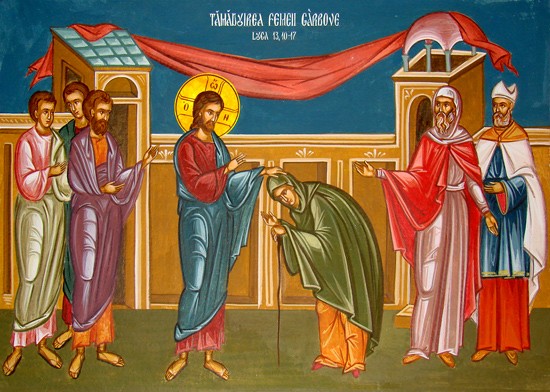Form and Substance (Luke 12, 10-17)
7 December 2020Today’s Gospel reading is a clear and obvious condemnation of religious formalism. Saint Luke the Evangelist tells us that Christ healed people on the Sabbath and that this brought Him into conflict with the Judaism of His era, which had transformed the Ten Commandments and the Law into a barren system of obligations and restrictions. The absurdity in the reactions of the religious establishment was tragic. The leader of the synagogue was indignant because the Lord’s miracle breached the rules for the observation of the Sabbath, which came from God.
So the message of today’s excerpt touches and concerns all of us, since we often, perhaps subconsciously, prioritize certain religious and ritual forms without any corresponding sensitivity in our heart or life. Christ’s healings on the Sabbath manifest the spirit of love and freedom which should also be present in the observation of God’s commandments. Although the substance transcends the form, the latter is still necessary to the extent that it expresses and protects the former.

Form, love and freedom
Formalism, as a tendency on our part to attach ourselves to forms and to ignore the substance of things, events and situations, is a disorder in our religious life. This human tendency is a kind of enslavement of the spirit, which, in the name of God, places rules above people and their needs. Naturally, we can’t conceive of the smooth organization and functioning of society, or the structure of religious life, without formal arrangements, institutions and laws. Freedom doesn’t mean reckless and irresponsible violation of the form, but a preference for the substance when this is stifled by the form. For this reason the sermons of the Lord and the message of the Gospel should be wings to help us soar up into life with God rather than weights that drag us down and suffocate our freedom and our soul. They should be stepping stones to allow us to discover the substance of matters, not obstacles trapping and enclosing us in their formality. For religiously active people in any era, the external religious form is necessary and, in fact, critical. It’s the litmus test for our inner relationship with God, our own self and others.
At this precise point, if we don’t want to tread the demanding path of sacrificial love, which will cost us dearly, we retreat into the external forms and gird ourselves with them, at no cost to ourselves. This is why formalism is attractive, even if it’s a slippery slope, because sterile piety is a half-measure in our comfortable religiosity. Wherever Christ’s truth is distorted and abused, we’re left with an empty shell.
But insistence on religious forms also conceals something more threatening. This is a new form of idolatry which becomes all the more terrible when it arises within the Church itself. It’s the replacement of Christ’s love with the observation of the Sabbath, in other words external form. This is something which should exercise us particularly, so that, whenever we’re tempted to cling to the form and practise, we’re careful not to lose the spirit and love. On another occasion, Christ said that the Sabbath was made for man, not man for the Sabbath (Mark 2, 27). Unfortunately, today we are witnessing the triumph of the ‘Sabbath’ over the Son of Man. This triumph of formalism often finds expression in fanaticism and the fragmentation of the faithful into factions which condemn all and sundry who think differently from them. They squabble among themselves and expend their zeal on the correctness of the formal ordinances and regulations, the gravity of the restrictions and prohibitions, the austerity of asceticism and the canons.
Beloved brothers and sisters, let’s ask ourselves whether the form of our piety corresponds to Christ’s command that we should love God and other people. And where, in our religious life, is the person for whom Christ came into the world? Whether, in the forms of our devotion, there’s love for God which is expressed as love for others? The coming feasts are an opportunity for us to discover and confirm this. Amen.






